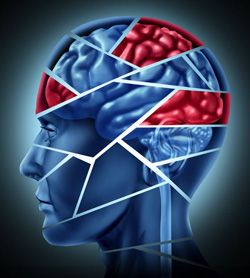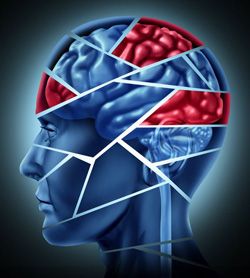What is An Adjustment Disorder?
An adjustment disorder occurs when a person has an exceptionally difficult time coping with stressful situations. When a stressful event occurs, most well-adjusted adults will exhibit emotional reactions that are proportionate to the stressor. Through coping strategies and internal resiliency, they are able to bounce back within an appropriate timeframe.
People suffering from an adjustment disorder may have more difficulty coping with change, stress, or grief-causing situations. This is because their emotional responses are often excessive and disproportionate to the stressor affecting them. In addition, the emotional overwhelm can produce emotional and physical symptoms that interfere with daily life.
Adjustment disorders can be complex to diagnose because the symptoms resemble those of other disorders so, a process of elimination is needed for a diagnosis.

What Are The Causes Of Adjustment Disorders?
Elevated levels of stress can trigger adjustment disorders. In many cases, the emotional response can be traced back to a specific stressful event or a significant change in the sufferer's life. For someone with an adjustment disorder, the occurrence of a major stressful event leads to unusually elevated and long-lasting levels of emotional distress.
We all have our own set of stress triggers, and we all handle stress differently. Someone with an adjustment disorder may experience significant stress in response to a situation that may seem low stress to someone else.
Some significant life changes and stressors that cause heightened levels of stress include:
- Getting fired from a job
- Moving to a new home or city
- The loss of a loved one
- Giving birth
- Marriage
- A break-up or divorce
- Environmental disasters
- Health-related issues
- Financial instability or insecurity
- Retirement
The Signs And Symptoms Of An Adjustment Disorder
The DSM 5 classifies adjustment disorders into six subtypes, each with a unique set of symptoms that differentiates it from the others. Adjustment disorders can be accompanied by emotional symptoms like depression and anxiety or behavioral changes that are considered disruptive to the self and society.
The symptoms vary slightly depending on the subtype. However, what they all have in common is that the emotional response to the stressor is more significant than would generally be expected for that situation.
The 6 Subtypes of Adjustment Disorders
Below is a breakdown of the six subtypes of adjustment disorders and the predominant symptoms for each:
Adjustment disorder with anxiety
The symptoms may include excessive worrying and nervousness, which can lead to feeling overwhelmed. Restlessness and an inability to focus on tasks are also commonly reported symptoms. If you suffer from adjustment disorder with anxiety, you may feel particularly resistant to change and accepting of new situations.
Adjustment disorder with depression
The adjustment disorder with depression subtype is accompanied by feelings of hopelessness, a frequent urge to cry or tearing up, frequent low mood, and difficulty finding joy in things you would usually enjoy doing. Other symptoms may include the feeling of worthlessness, lowered self-esteem, and in severe cases, suicidal thoughts.
Adjustment disorder with depression and anxiety
People experiencing adjustment disorder with depression and anxiety will experience a mix of symptoms related to both. However, the combination of the symptoms and the degree to which they're experienced will vary for each person.
Adjustment disorder with disturbance of conduct
A person suffering from adjustment disorder with a disturbance of conduct will experience undesirable behavioral changes that can become problematic if left unmanaged. Disturbance of conduct is marked by a lack of respect for societal rules and norms and a lack of respect for the feelings and rights of others. Problematic behaviors may include:
- Vandalizing the property of others
- Driving recklessly
- Picking fights with strangers
- Stealing
- Other similarly deviant behaviors
Adjustment disorder with disturbance of conduct and emotional symptoms
In this subtype, a person with an adjustment disorder will experience behavioral disturbances accompanied by emotional symptoms related to anxiety and depression.
Unspecified
This category is used when none of the other subtypes seem to fit. However, there is evidence of emotional or physical distress leading to impaired daily functioning.
Other symptoms associated with adjustment disorder can include physical symptoms such as insomnia, fatigue, body aches, soreness, and indigestion.
How Is An Adjustment Disorder Diagnosed?
An adjustment disorder is usually triggered by a specific stressful or traumatic event. A mental health professional will assess your symptoms, how long they've been going on, and ask about any potentially stressful events that recently occurred in your life.
The criteria for diagnosing an adjustment disorder include:
- Experiencing behavioral or emotional symptoms within three months of a stressful event occurring in your life.
- Experiencing heightened stress levels compared to what is considered within the norm for that stressor.
- The level of stress interferes with areas of life such as work, school, or relationships.
- Another mental disorder cannot explain the symptoms
How To Treat Adjustment Disorders?
The good news is that adjustment disorders are often situational, resulting from a significant life change or stressful event. Therefore, they're highly treatable. Psychotherapy or cognitive behavioral therapy can help find the root cause of the stress and mediate the internal emotional conflict the situation has created. In addition, therapy can teach you healthy coping strategies and new ways to manage your stress.
When symptoms of anxiety or depression are severe, a psychiatrist may prescribe medication like anti-depressants and anxiolytics alongside therapy.
How We Can Help
When you're feeling anxious, stressed, or depressed, the last thing you may want is to commute to a doctor's office. At National Mental Health, we aim to provide accessible, virtual therapy so you can get psychiatric care online from the comfort of your home.
Our licensed mental health providers are trained to provide telehealth psychiatry and virtual medicine management. If your psychiatrist determines you can benefit from medication alongside therapy, they'll be able to prescribe what you need.
Get in touch to speak with a provider today!

